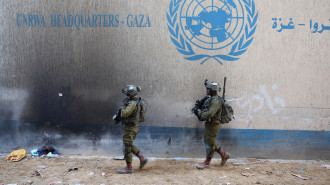Hizballah fighting Islamic State in Iraq
Lebanese Shia movement, Hizballah, have until recently kept its military campaign in Syria an official secret.
When body bags of fighters returned home to Lebanon in their dozens, it became increasingly difficult for the leadership to deny their presence in Syria.
Having helped to prop up the regime of Bashar al-Assad since the beginning of the Syrian Revolution, Hizballah appear to be aiding another ally in the region – Iraq.
Aiding an ally
Although Hizballah activities in Iraq are shrouded in mystery, the militant group's leader Hassan Nasrallah announced yesterday that his fighters are taking part in military action in the country.
"We may not have spoken about Iraq before, but we have a limited presence because of the sensitive phase that Iraq is going through," the militant leader said.
Nasrallah said that his fighters are taking part in the first phase of a military campaign in the country, but pressed the need for a political solution to the ongoing Syria crisis.
"The [Syrian] government is ready to make a deal with the moderate opposition but not the terrorists," he said. Opponents of the Syrian revolution routinely refer to all armed opposition groups in Syria as "terrorists".
Nasrallah also used the speech as an opportunity to counter the call by former Lebanese prime minister Saad Hariri for Hizballah fighters to pull out of Syria.
"Let's go together to Syria or rather let's go to any place where we face this threat because in this way we are defending Lebanon and other countries."
Lebanese and Syrian armies should unite against the threat posed by the Islamic State group (IS, formerly known as ISIS) and al-Nusra Front, he says, as these groups also pose a threat to Lebanon and not just Damascus.
| Hizballah appear to be aiding another ally in the region – Iraq. |
"The tafkiri movement (a term used to describe extremist Sunni groups in Syria) is not only a threat to some governments, it is a threat for all countries and people."
"It is a threat for Islam as a religion and as a message. Israel is the only country that does not think IS is a threat because everything IS does serves its interests. IS' goal is Mecca, not Jerusalem.”
Bridging the gulf
Nasrallah also alleged that it is the Iraqi army, local tribes, militias, and Kurdish groups that have prevented IS from extending their territory into other countries in the region.
Gulf states, and particularly their rulers, have most to lose from a resurgence al-Qaeda and Islamic State group and this should force them to approach regional affairs in a different way, he said.
Opponents have frequently accused the Gulf countries of supporting extremist groups in Syria and Iraq.
The revolution in Yemen is what is standing in the way of al-Qaeda, which plans to take over Syria and Saudi," he said.
On the domestic front, Nasrallah said that dialogue with the Future Movement was taking place and showing some positive signs of agreement between the two rival parties.
Nasrallah said there was general agreement on how to combat terrorism, but the two could not agree on a strategy to confront Israel.
There is growing support in Lebanon for dialogue between political parties to solve the ongoing presidential crisis in the country. Lebanon has been without a president for eight months.
"We must resume internal efforts. To all the people interested in filling the vacuum, I say do not wait for changes inside and outside the region because the region to heading towards more conflicts and crisis. So let us resume the internal efforts to end this issue."
This article is an edited translation from our Arabic edition.

![Palestinians mourned the victims of an Israeli strike on Deir al-Balah [Getty]](/sites/default/files/styles/image_684x385/public/2024-11/GettyImages-2182362043.jpg?h=199d8c1f&itok=xSHZFbmc)


![The law could be enforced against teachers without prior notice [Getty]](/sites/default/files/styles/image_684x385/public/2178740715.jpeg?h=a5f2f23a&itok=hnqrCS4x)
 Follow the Middle East's top stories in English at The New Arab on Google News
Follow the Middle East's top stories in English at The New Arab on Google News


